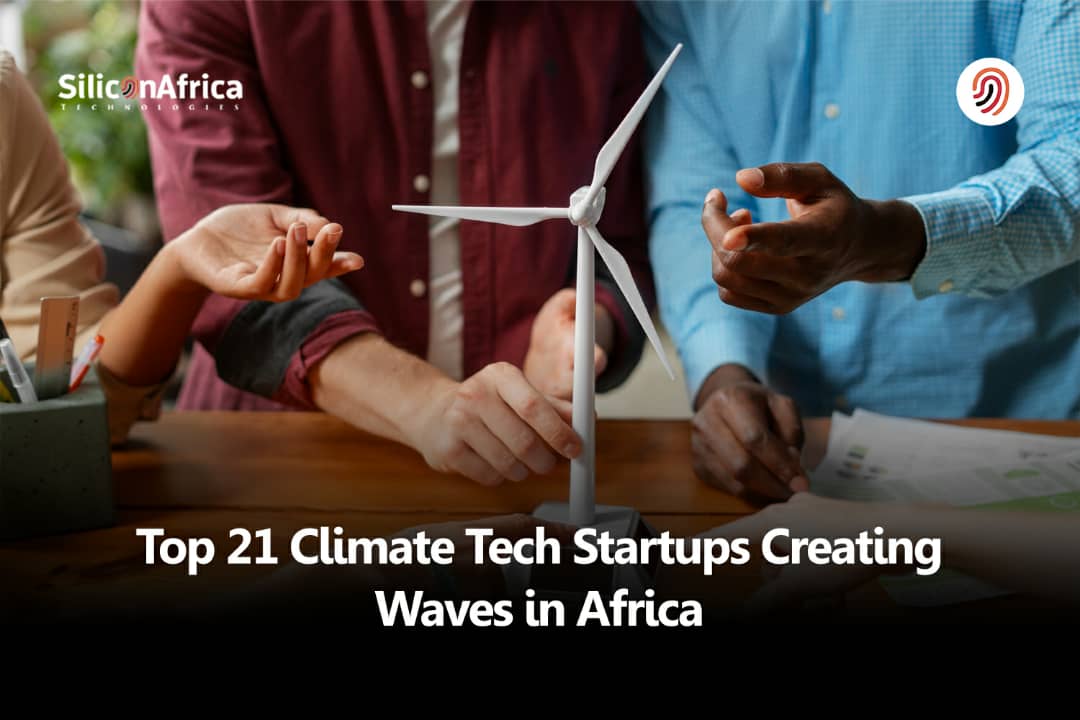Newsletter Subscribe
Enter your email address below and subscribe to our newsletter

The African ClimateTech ecosystem is rapidly becoming a talent, growth, and transformation hotspot.
With a unique blend of innovation and opportunity, Africa is poised to lead the charge in addressing climate change through cutting-edge technology.

In this article, we will examine a list of the top 21 Climate Tech startups leveraging the opportunities of the internet age.
These startups operate across various fields impacting our climate, including water security, carbon capture, renewable energy, and biodiversity data.
These innovators diligently ensure that Africa becomes a leader in climate change technology.
Also read: The Increasing Need for Laundry Equipment in Kenya Leads to a Boom in Compact Appliances
Humankind is now facing arguably the greatest innovation challenge ever: the world has ten years to halve global greenhouse gas emissions by 2050 to achieve net zero.
The State of Climate Tech 2020 report showed that critical climate tech solutions are gaining increasing investor interest.
Recent analyses have explored how investors secure climate impact and commercial returns from this emerging asset class.
These investments are crucial in keeping the Paris Agreement’s goal of limiting global warming to below 1.5 degrees Celsius within reach.
Climate tech refers to technologies explicitly focused on reducing GHG emissions or addressing the impacts of global warming. Climate tech applications can be grouped into three broad, sector-agnostic categories:
Climate tech is intentionally broad to encompass the wide range of technologies and innovations addressing GHG emissions across various industries.
The data underpinning this analysis includes venture capital and private equity investments into startups that have raised at least US$1 million in funding. The funding round types analyzed include grants, Angel, Seed, Series A-H, and IPOs (including SPACs).
Since the data sources have stronger coverage in European and North American markets, this analysis may conservatively estimate the relative levels of Chinese investment and overall investment.
Also read: South Africa Might Take the EU’s New Carbon Tax to the World Trade Organization
The shortlist includes startups from across 11 African nations working in:
These sectors are all crucial for addressing various sustainability challenges and promoting environmental stewardship in Africa and beyond!
Here is a list of Climate Tech Startups that are making significant changes in our Climate in Africa:
Mouhamadou Lamine Kebe founded Tolbi. This startup specializes in sustainable and eco-friendly packaging solutions using bioplastics, reducing plastic waste, and promoting a circular economy.
Benjamin Rombaut is the founder of Sand to Green, a Moroccan Climate Tech startup that is concerned with transforming desert areas into sustainable agricultural land with innovative irrigation systems, enhancing food security, and mitigating desertification.
Founded by Mohammed M. Khaled, they offer sustainable and eco-friendly home cleaning products, promoting a toxin-free environment and reducing chemical pollution.
Martin Freimuller founded this startup to develop carbon capture and utilization technologies for industrial applications, reducing greenhouse gas emissions and fostering a low-carbon economy.
Founded by Ogwal Joseph, Agro Supply provides sustainable agricultural inputs and services to smallholder farmers, enhancing productivity and promoting sustainable farming practices.
Founded by Tope Sulaimon and Boluwatife Arewa, Scrapays creates a waste management platform that promotes recycling, upcycling, and proper waste disposal, reducing pollution and fostering a circular economy.
Founded by Benjamin Njenga, Apollo Agriculture is concerned with developing precision farming and insurance solutions for smallholder farmers, enhancing productivity, and promoting sustainable agriculture.
Founded by Samir Ibrahim, SunCulture offers solar-powered irrigation systems and agricultural solutions, reducing energy costs and promoting sustainable farming.
Founded by Kate Kallot, Amini AI develops AI-powered sustainable energy solutions for buildings and homes, reducing energy consumption and enhancing energy efficiency.
An idea born in Sweden, and founded by Filip Lövström, Roam creates electric motorbikes and sustainable transportation solutions, reducing greenhouse gas emissions and promoting eco-friendly transportation.
Founded by Kidus Asfaw, Kubik develops sustainable and modular housing solutions using recycled materials, reducing waste and promoting green construction practices.
Iheb Triki founded Kumulus Water offers innovative water management and conservation solutions, reducing water waste and promoting efficient water use.
Led by their charismatic leader, Desmond Koney, Complete Farmer provides digital agricultural solutions and farm management services, enhancing productivity and promoting sustainable farming practices.
Founded by Jit Bhattacharya, BasiGo develops battery-swapping technology for electric vehicles, reducing range anxiety and supporting sustainable transportation.
Founded Shobhita Soor, this innovative startup creates plant-based and sustainable food alternatives, reducing greenhouse gas emissions and promoting sustainable agriculture.
Led by their able leader, Tim Ohlsen. Hohm Energy offers energy storage and management solutions for homes and businesses, reducing energy consumption and boosting efficiency.
A Nigerian startup founded by Chidalu Onyenso, EarthBond develops sustainable and eco-friendly construction materials, reducing waste and supporting green building practices.
Another Nigerian startup led by Bimbola Adisa, Beacon Power Service provides energy management and backup power solutions, lowering energy costs and promoting efficiency.
Read Also: Top 21 Healthcare Startups Creating Waves in Africa
Founded by Greg Murray, Koko Networks develops smart and sustainable cooking solutions for households, reducing energy consumption and fostering sustainable cooking practices.
Founded by Malango Washikala, Altech offers sustainable and eco-friendly water treatment solutions, reducing water pollution and promoting clean water use.
Founded by Matthieu de Gaudemar, Kudoti creates a waste management platform that encourages recycling, upcycling, and proper waste disposal, reducing pollution and supporting a circular economy.
These startups address various sustainability challenges, from sustainable agriculture and energy efficiency to waste management and eco-friendly products. Their innovative solutions pave the way for a greener, more sustainable future.
Although COP26 has left a sense of optimism for climate technology innovation in Africa, driven by pledges of $100 billion in renewables and $2 billion in environmental conservation and food systems to help cut GHG emissions, build stronger communities, and facilitate climate tech opportunities, Africa needs to bolster the facilitation of ecosystem players to meet the demands of nearly 8 billion people by 2050 while achieving net zero targets.
The sheer weight of population growth and the rapid pace of climate change necessitate a reimagining of Africa’s climate tech agendas. This includes strengthening climate tech policies by reducing policy barriers, facilitating local investor ecosystems with improved financial mechanisms such as patient capital, and building stronger tech ecosystems with hubs across the continent to harness the talent of local economies.
African climate tech stakeholders, from founders and corporations to investors, must collaborate to seize this opportunity. By working together, they can mitigate climate change across Africa and improve the livelihoods of every African.
Read Also: Top 21 Mental Health Startups Creating Waves in Africa
In conclusion, the landscape of ClimateTech in Africa is vibrant and promising, with a diverse range of startups tackling pressing sustainability challenges. From innovative agricultural solutions to renewable energy initiatives and waste management platforms, these startups are driving meaningful change across the continent.
As we move forward, it is crucial for stakeholders, including governments, investors, and communities, to collaborate and support the growth of ClimateTech. Strengthening policies, fostering local investment ecosystems, and nurturing talent through tech hubs will be key in realizing Africa’s potential as a leader in climate innovation.
With continued dedication and collective action, Africa can address climate change and create opportunities for economic growth, environmental stewardship, and improved livelihoods for its people. The time to invest in ClimateTech and sustainable solutions is now, and Africa is poised to play a pivotal role in shaping a greener, more resilient future for all.
African ClimateTech startups are addressing a range of challenges, including sustainable agriculture practices, renewable energy solutions, waste management, water conservation, and eco-friendly product development. These startups are innovating to mitigate climate change impacts, enhance resource efficiency, and promote environmental sustainability.
Policymakers can strengthen the ClimateTech innovation ecosystem by implementing supportive policies and regulations, providing incentives for investment in ClimateTech, fostering collaboration between government, academia, and industry, and promoting research and development in sustainable technologies.
Local investors play a crucial role in supporting ClimateTech startups by providing funding, mentorship, and networking opportunities. They help startups scale their solutions, access new markets, and navigate regulatory challenges. Additionally, local investors contribute to building a robust ecosystem for sustainable innovation in Africa.
ClimateTech hubs serve as collaborative spaces where startups can access resources, expertise, funding, and networking opportunities. These hubs provide a supportive environment for ideation, prototyping, testing, and scaling ClimateTech solutions. By fostering innovation and collaboration, ClimateTech hubs contribute to the growth and success of startups in Africa.
ClimateTech solutions have a dual impact on environmental sustainability and economic development in Africa. They help reduce greenhouse gas emissions, conserve natural resources, improve air and water quality, and mitigate climate change impacts. Additionally, ClimateTech innovation creates job opportunities, stimulates economic growth, attracts investment, and enhances communities’ resilience to climate-related challenges.